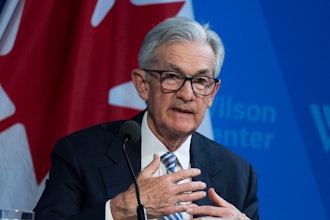WASHINGTON (AP) — The U.S. trade deficit widened only slightly in August, dragged lower by a modest decline in exports. U.S. farmers sold fewer agricultural products overseas, offsetting the best month of sales for American-made cars on record.
The trade deficit grew 0.4 percent in August to $38.8 billion, the Commerce Department reported Thursday. That's up from $38.6 billion in July.
U.S. exports dipped 0.1 percent to $189.2 billion. Sales of wheat, soybeans and other farm products fell, while exports of autos and other manufactured goods rose. U.S. auto exports climbed to a record $13.1 billion, up 5.5 percent from the July level.
Imports were mostly unchanged at $228 billion. Americans bought more foreign computers and machinery, while imports of oil and foreign-made cars declined.
This year's trade deficit is running 10.8 percent below last year's, a positive sign for economic growth. A smaller trade deficit acts as a boost to economic growth when it shows American companies earning more in their foreign sales.
The monthly deficit hit a four-year low in June. It has risen only slightly in the past two months.
The trade report was released three weeks late because of the 16-day partial government shutdown in early October. Many economists estimate the shutdown cut about $25 billion from the economy. Several have lowered their forecasts for growth in the October-December quarter by a half-point to an annual rate of 2 percent or less.
The deficit with China dipped 0.6 percent in August to $29.8 billion after hitting a monthly record of $30.1 billion in July. So far this year, the deficit with China is up 2.3 percent from its record pace in 2012. That could increase pressure on the Obama administration to take a harder line on trade issues with China. American manufacturers contend China manipulates its currency and engages in other unfair practices to gain trade advantages over U.S. companies.
The International Monetary Fund trimmed its global economic forecast earlier this month in part because of slower growth in China, India, Brazil and other developing countries. These nations are big markets for U.S. goods so slower growth in the developing world could hurt American exports.
Europe's weak economy is also weighing on U.S. exports. The deficit with the 28-nation European Union fell 29.9 percent in August to $9.8 billion after surging to a record high in July. U.S. exports to the region rose 2.2 percent in August. But they are down 3.9 percent for the year, reflecting in part sub-par economic activity as many European countries are still struggling to overcome a prolonged debt crisis.
U.S. factories could also be affected by the government shutdown, which is expected to depress consumer spending and therefore reduce domestic demand. Before the shutdown occurred in early October, the outlook for manufacturing had been improving.
Factory activity had expanded at the fastest pace in 2½ years in September, according to a survey by the Institute for Supply Managers.
The Federal Reserve is watching economic data to determine whether it should reduce its monthly bond purchases. Those purchases have been intended to give the economy a boost by keeping long-term borrowing costs low.
Hiring has slowed from the start of the year. Employers created just 148,000 jobs in September, down from 193,000 in August.






















